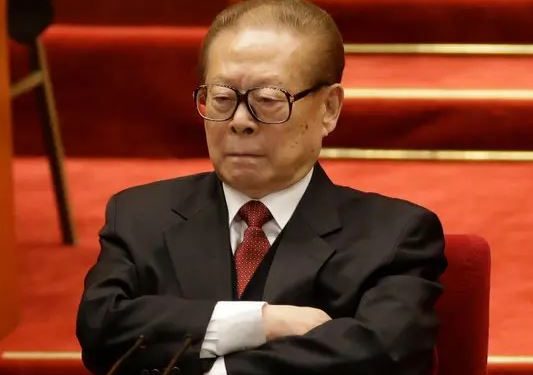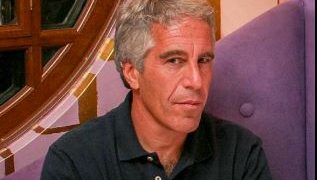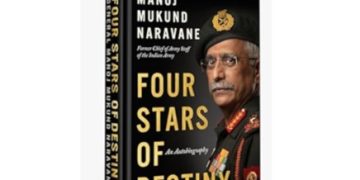Beijing: Former President Jiang Zemin, who led China out of isolation after the army crushed the Tiananmen Square pro-democracy protests in 1989 and supported economic reforms that led to a decade of explosive growth, died Wednesday. He was 96.
Jiang died of leukemia and multiple organ failure in Shanghai, where he was a former mayor and Communist Party secretary, state TV and the official Xinhua News Agency reported.
A surprise choice to lead a divided Communist Party after the 1989 turmoil, Jiang saw China through history-making changes including a revival of market-oriented reforms, the return of Hong Kong from British rule in 1997 and Beijing’s entry into the World Trade Organization in 2001.
Even as China opened to the outside, Jiang’s government stamped out dissent. It jailed human rights, labor and pro-democracy activists and banned the Falun Gong spiritual movement, which the ruling party saw as a threat to its monopoly on power.
Jiang gave up his last official title in 2004 but remained a force behind the scenes in the wrangling that led to the rise of current President Xi Jinping, who took power in 2012.
Xi has tightened political control, crushed China’s little remaining dissent and reasserted the dominance of state industry.
Rumors that Jiang might be in declining health spread after he missed a ruling party congress in October at which Xi, China’s most powerful figure since at least the 1980s, broke with tradition and awarded himself a third five-year term as leader.
Jiang was on the verge of retirement as Shanghai party leader in 1989 when he was drafted by then-paramount leader leader Deng Xiaoping to pull together the party and nation. He succeeded Zhao Ziyang, who was dismissed by Deng due to his sympathy for the student-led Tiananmen Square protesters and was held under house arrest until his 2005 death.
In 13 years as party general secretary, China’s most powerful post, Jiang guided the country’s rise to economic power by welcoming capitalists into the ruling party and pulling in foreign investment after China joined the WTO. China passed Germany and then Japan to become the second-largest economy after the United States.
Jiang captured a political prize when Beijing was picked as the site of the 2008 Summer Olympics after failing in an earlier bid.
A former soap factory manager, Jiang capped his career with the communist era’s first orderly succession, handing over his post as party leader in 2002 to Hu Jintao, who also took the ceremonial title of president the following year.
Jiang tried to hold onto influence by staying on as chairman of the Central Military Commission, which controls the party’s military wing, the 2 million-member People’s Liberation Army. He gave up that post in 2004 following complaints he might divide the government.
Even after he left office, Jiang had influence over promotions through his network of proteges.
He was said to be frustrated that Deng had picked Hu as the next leader, blocking Jiang from installing his own successor. But Jiang was considered successful in elevating allies to the party’s seven-member Standing Committee, China’s inner circle of power, when Xi became leader in 2012.
Portly and owlish in oversize glasses, Jiang was an ebullient figure who played the piano and enjoyed singing, in contrast to his more reserved successors, Hu and Xi.
He spoke enthusiastic if halting English and would recite the Gettysburg Address for foreign visitors. On a visit to Britain, he tried to coax Queen Elizabeth II into singing karaoke.
Jiang had faded from public sight and last appeared publicly alongside current and former leaders atop Beijing’s Tiananmen Gate at a 2019 military parade celebrating the party’s 70th anniversary in power.
Jiang was born Aug. 17, 1926, in the affluent eastern city of Yangzhou. Official biographies downplay his family’s middle-class background, emphasizing instead his uncle and adoptive father, Jiang Shangqing, an early revolutionary who was killed in battle in 1939.
After graduating from the electrical machinery department of Jiaotong University in Shanghai in 1947, Jiang advanced through the ranks of state-controlled industries, working in a food factory, then soap-making and China’s biggest automobile plant.
Like many technocratic officials, Jiang spent part of the ultra-radical 1966-76 Cultural Revolution as a farm laborer. His career rise resumed, and in 1983 he was named minister of the electronics industry, then a key but backward sector the government hoped to revive by inviting foreign investment.
As mayor of Shanghai in 1985-89, Jiang impressed foreign visitors as a representative of a new breed of outward-looking Chinese leaders.
A tough political fighter, Jiang defied predictions that his stint as leader would be short. He consolidated power by promoting members of his “Shanghai faction” and giving the military double-digit annual percentage increases in spending.
Foreign leaders and CEOs who shunned Beijing after the crackdown were persuaded to return.
When Deng emerged from retirement in 1992 to push for reviving market-style reform in the face of conservative opposition after the Tiananmen crackdown, Jiang followed.
He supported Premier Zhu Rongji, the party’s No. 3 leader, who forced through painful changes that slashed as many as 40 million jobs from state industry in the late 1990s.
Zhu launched the privatization of urban housing, igniting a building boom that transformed Chinese cities into forests of high-rises and propelled economic growth.
After 12 years of negotiations and a flight by Zhu to Washington to lobby the Clinton administration for support, China joined the WTO in 2001, cementing its position as a magnet for foreign investment.
Despite a genial public image, Jiang dealt severely with challenges to ruling party power.
His highest-profile target was Falun Gong, a meditation group founded in the early ’90s. Chinese leaders were spooked by its ability to attract tens of thousands of followers, including military officers.
Activists who tried to form an opposition China Democracy Party, a move permitted by Chinese law, were sentenced to up to 12 years in prison on subversion charges.
“Stability above all else,” Jiang ordered, in a phrase his successors have used to justify intensive social controls.
It fell to Jiang, standing beside Britain’s Prince Charles, to preside over the return of Hong Kong on July 1, 1997, symbolizing the end of 150 years of European colonialism. The nearby Portuguese territory of Macao was returned to China in 1999.
Hong Kong was promised autonomy and became a springboard for mainland companies to go abroad. Meanwhile, Jiang turned to coercion with Taiwan, the self-ruled island Beijing says is part of its territory.
During Taiwan’s first direct presidential election in 1996, Jiang’s government tried to intimidate voters by firing missiles into nearby shipping lanes. The United States responded by sending warships to the area in a show of support.
At the same time, trade between the mainland and Taiwan grew to billions of dollars a year.
China’s economic boom split society into winners and losers as waves of rural residents migrated to factory jobs in cities, the economy grew sevenfold and urban incomes by nearly as much.
Protests, once rare, spread as millions lost state jobs and farmers complained about rising taxes and fees. Divorce rates climbed. Corruption flourished.
One of Jiang’s sons, Jiang Mianheng, courted controversy in the late 1990s as a telecommunications dealmaker and later the chairman of phone company China Netcom Co.
Critics accused him of misusing his father’s status to promote his career, a common complaint against the children of party leaders.
Jiang Mianheng, who has a Ph.D. From Drexel University, went on to hold prominent academic positions, including president of ShanghaiTech University in his father’s old power base.
Jiang is survived by his two sons and his wife, Wang Yeping, who worked in government bureaucracies in charge of state industries.
AP






































